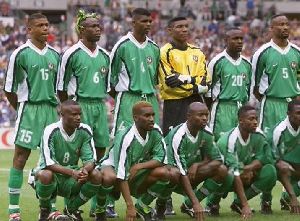Since gaining independence in 1960, Nigeria has demonstrated a sustained commitment to sports, achieving notable successes on the global stage. In football, athletics, basketball, boxing, table tennis, and women’s sports, Nigerian athletes have secured significant victories, set world records, and established a distinct national sporting identity.
Football occupies a central position in Nigerian society, serving as a unifying force and a source of national identity, particularly during periods of social or economic difficulty. This unity set the stage for Nigeria’s earliest football triumphs.
Nigeria’s first moments with history came in 1980, when the Super Eagles, powered by Segun Odegbami’s brilliance and Muda Lawal’s midfield command, lifted the African Cup of Nations (AFCON) on home soil in Lagos. A 3–0 triumph over Algeria set off nationwide celebrations, announcing Nigeria’s arrival as a continental giant.
In 1994, Nigeria secured its second AFCON title in Tunisia, led by players such as Rashidi Yekini, Jay-Jay Okocha, and Emmanuel Amuneke. This victory represented a significant development in Nigerian and African football.
In 1994, the Super Eagles made their debut at the FIFA World Cup in the United States, defeating Argentina and finishing first in their group. Although eliminated by Italy in the Round of 16, Nigeria achieved a FIFA ranking of fifth, the highest for any African nation at that time.
But perhaps the pinnacle came in 1996 at the Atlanta Olympics, when Nigeria’s U-23 “Dream Team” stunned the entire world. They came from behind to beat Brazil 4–3 in the semi-final and then defeated Argentina 3–2 in a pulsating final. The gold medal was more than an Olympic triumph; it was Africa’s declaration that it could compete with, and conquer, the very best.
After years of near-misses, the Eagles reclaimed continental glory in 2013, lifting their third AFCON title in South Africa under coach Stephen Keshi. It was a poignant victory, Keshi became one of only two men to win the AFCON both as player and coach, etching his name in African football folklore.
While football brought glory, Nigeria’s athletics story has been one of grit, resilience, and breakthroughs. The defining moment arrived in 1996 at the Atlanta Olympics, when Chioma Ajunwa soared 7.12m to win the women’s long jump. She became Nigeria’s first-ever Olympic gold medalist, a trailblazer for women in sport. That same Games, Falilat Ogunkoya won bronze in the 400m, the first Nigerian woman to earn an individual Olympic track medal.
Four years later at the Sydney Olympics, the women’s 4x400m relay team initially won silver, but more than a decade later, doping disqualifications upgraded Nigeria to gold, a belated but deserved recognition of their excellence.
The 2000s and 2010s saw the rise of Blessing Okagbare, who won Olympic silver in Beijing 2008, dominating African sprints, and achieving the rare double of 100m and 200m gold at the 2014 Commonwealth Games.
Then in 2022, the world stood still as Tobi Amusan shattered the 100m hurdles world record (12.12s) at the World Championships in Oregon. She not only became Nigeria’s first World Athletics Champion, but also turned the global spotlight on Nigerian talents once more. Her tears on the podium symbolised decades of hard work, and her triumph remains one of the greatest moments in African track history.
As Nigerians celebrated football and athletics, basketball emerged, turning Nigeria into a basketball powerhouse. The turning point came in 2015, when D’Tigers defeated Angola to win their first AfroBasket title in Tunisia. It was a statement victory against Africa’s traditional giants.
D’Tigress in jubilant mood after clinching their fifth consecutive AfroBasket title in August 2025
Then in 2021, in a Tokyo Olympic warm-up game, Nigeria shocked the world by beating the USA 90–87 against all odds and bookmakers. For a country long considered outsiders in global basketball, this was a watershed moment. It showed that African teams could no longer be underestimated.
Even more dominant on the continental stage have been D’Tigress, Nigeria’s women’s national basketball team. They stamped their authority as the queens of African basketball by winning five consecutive AfroBasket titles (2017, 2019, 2021, 2023, 2025), a run unmatched in the competition’s history.
Their dominance extended to the global stage at the Paris 2024 Summer Olympics, where they finally ended a two-decade wait for victory. Nigeria stunned Australia 75–62 to record their first Olympic win in 20 years, before scripting another historic chapter with a 79–70 triumph over Canada. That result made D’Tigress the first African basketball team—male or female—to reach the Olympic quarter-finals.
The milestone outing was crowned when head coach Rena Wakama was named Best Coach of the Tournament by FIBA, a fitting recognition for her leadership of a team that continues to inspire and break barriers.
In the same vein, Nigeria’s boxing heritage predates independence, with Hogan “Kid” Bassey becoming the country’s first world champion in 1957. But the true symbol of the 1960s was Dick Tiger, who held world titles in two weight classes and became one of the most respected fighters of his era.
In 2008, Samuel Peter won the WBC Heavyweight title when he defeated Oleg Maskaev by TKO in Mexico. Though Peter’s reign lasted only seven months, as a returning Vitali Klitschko eventually defeated him. As the years went by, the spotlight shifted to Anthony Joshua, the Nigerian-British heavyweight. Between 2016 and 2017, Joshua unified multiple world titles, carrying the Nigerian flag proudly alongside the British one. His triumphs rekindled memories of Nigeria’s rich boxing tradition, proving that the nation’s fighting spirit still burns brightly.
Few Nigerian athletes have been as consistent as Segun Toriola, who represented the country in seven consecutive Olympic Games (1992–2016), a record for African athletes. His longevity and resilience made him a role model across the continent.
The torch has since been carried by Aruna Quadri, who became the first African to break into the ITTF world top 10. His runs at the 2014 and 2016 World Cup, where he stunned higher-ranked opponents, established Nigeria as a force in world table tennis.
No story of Nigerian sports is complete without the Super Falcons, Africa’s most successful women’s football team. With 11 AFCON titles, they have been untouchable on the continent. Their finest moment came in 1999, when they reached the quarterfinals of the FIFA Women’s World Cup, becoming the first African team to do so.
Beyond football, Nigerian women have excelled in the Commonwealth Games and All Africa Games, racking up medals in athletics, boxing, wrestling, and weightlifting. These triumphs have made Nigerian women symbols of resilience and excellence in sport.
From Dick Tiger’s fists in the 1960s, to the Super Eagles’ magical nights in 1994 and 1996, from Ajunwa’s historic leap to Amusan’s world record, Nigeria’s sporting history is a rich tapestry of triumphs. Basketball dominance, boxing legends, table tennis pioneers, and women’s football queens have all added to this heritage.
For a nation often tested by challenges, sport has always provided moments of unity, joy, and belief. These achievements remind Nigerians that no dream is too high, no goal too distant. As the story continues beyond 2025, the world watches, knowing that when Nigeria takes the stage, history is always within reach.
Sports News of Sunday, 5 October 2025
Source: www.dailytrust.com













